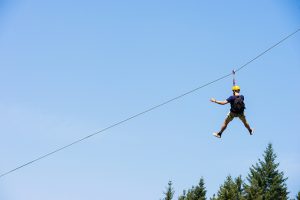There’s Always A Risk With Extreme Activities
 Michael Babboni
Personal Injury
Life is all about choices, and fortunately, in America, we are blessed with having a great many choices, especially when it comes to things like how we decide to shape our future and, if you live in Florida, how you’re going to enjoy yourself. Thanks to the mild weather we experience in this part of the USA, we can enjoy many outdoor activities all throughout the year. This includes what are considered “extreme sports” activities such as zip lines or para sailing that include an extra level of tension and adventure.
Michael Babboni
Personal Injury
Life is all about choices, and fortunately, in America, we are blessed with having a great many choices, especially when it comes to things like how we decide to shape our future and, if you live in Florida, how you’re going to enjoy yourself. Thanks to the mild weather we experience in this part of the USA, we can enjoy many outdoor activities all throughout the year. This includes what are considered “extreme sports” activities such as zip lines or para sailing that include an extra level of tension and adventure.And this is where problems can come in. While every American business is predicated on giving customers what they want, sometimes what customers want can entail big risks they may not be aware of, or, for some reason, think won’t happen to them. “Extreme sports,” are activities that place average Americans in extraordinary experiences. Parasailing, for example, drags customers by motorboat through the water, until enough speed has built up that the parachute they are wearing lifts them into the air. Ziplines are another activity, where what was once used to cross huge gaps by traveling across a cable with a pulley system is now a recreational activity.
In both of these cases, these were intense, physical activities with a high degree of risk involved. Now, anyone can pay a little money engage in these activities. But just because these extreme sporting activities are now widely available, this doesn’t mean that they are necessarily safer.
No Regulation, No Insurance
Unlike some of the other activities you may participate in, such as rides on the carnival, things like zip lines and para sailing have little to no regulation from the state. This means that there are no minimum safety standards that companies are legally obligated to meet, so the quality and safety of the experience can vary wildly from one company to the next.
Parasailing, for example, doesn’t require the boats to have any marine weather radio to report on atmospheric developments that may put customers at risk. The cables used to tow customers do not have to be inspected to ensure structural integrity. Some companies may do this on their own out of an admirable sense of responsibility, but they are not legally required to.
The other consideration to keep in mind is that these activities do not necessarily require the companies to be insured either. This means that in the event of an accident, even if the company is proven at fault, should you decide to pursue a case with a personal injury lawyer at your side, the financial compensation you are owed may not be as large as what you deserve. And this is simply because these companies do not necessarily need the backing of an insurance company to cover accidents.
Your Choice, Your Risk
This means that when you decide to engage in these kinds of extreme sports activities, you should be prepared to accept the fact that you may get little or no financial compensation should things go wrong. If anything should happen to you during one of these activities, you should always find out what your legal options are by consulting an accident lawyer.
